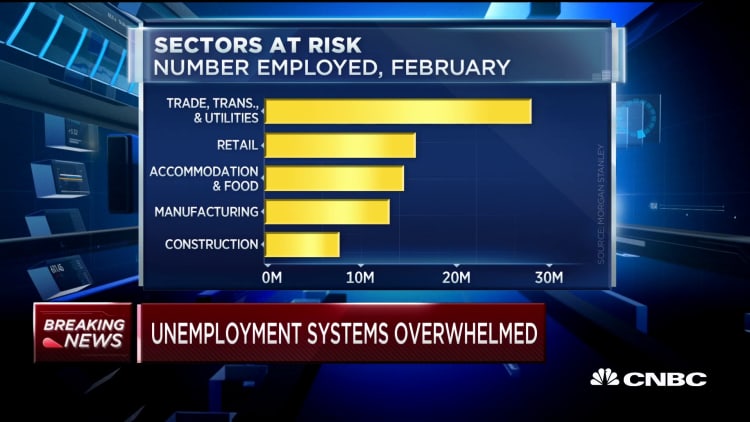When New York City officials ordered schools, bars and restaurants to close last week to contain the spread of the coronavirus pandemic, Tatiana Herrera lost not one, but two jobs.
Herrera, a millennial who lives in Brooklyn, was laid off from her gig as a bartender when the Pencil Factory Bar closed its doors. Simultaneously, her part-time role as a substitute teacher at a charter school in upper Manhattan also disappeared when schools closed.
Multiple jobs have been a way of life for Herrera since she graduated from college five years ago. "You have the main thing you want to do, but then there's always the side hustle, sometimes you need a second hustle or a third," Herrera tells CNBC Make It. Earlier this year, Herrera was juggling four jobs, including one as a registered real estate agent. While she's still technically employed as a real estate agent, in-person open houses are a thing of the past for now.
"I'll be honest, I don't really know what will happen next month if I don't get another job," Herrera says.
It's a concern facing millions of Americans as cities around the U.S. suspend business. Nearly six in 10 Americans say their income has been negatively impacted by coronavirus, according to TransUnion's poll of over 3,000 U.S. adults fielded earlier this week. Of those affected, about 45% of millennials (ages 24 to 39) surveyed say they've had their work hours cut, while nearly one in five say they've been laid off.
"Whether it's their health, financial well-being or changes in day-to-day living, the lives of tens of millions of people in the U.S. and abroad have been dramatically changed," says Amy Thomann, head of consumer credit education at TransUnion.
TransUnion's poll, while just a snapshot of how Americans are being impacted, shows 70% of Americans are concerned about paying their bills and making good on loans. For Herrera, the biggest worry is rent.
Herrera splits her $2,000 monthly rent with a roommate, but both are currently out of work — leaving Herrera on the hook to pay the full amount for the 2-bedroom apartment since the lease is in her name. "I reached out to my landlord and he was nice enough to say he'd consider an extension, which is helpful," Herrera says. But it's not a long-term solution.
New York has instituted an eviction ban that's in place until at least June 20. While that means she won't be kicked out of her apartment right away, Herrera still wants to be a good tenant. "I really want to stay here and my lease would technically be up in May, so now what if my landlord doesn't want to renew my lease?" she worries.
Despite the uncertainty, Herrera remains optimistic. At least for the moment, she has a roof over her head, she's healthy and she has food. Herrera used the last of her tips from the bar to stock up on groceries. "I went into recession mode and bought a ton of cans and things that are going to last me," she says.
She's spending her days applying for jobs, including looking to see if there are any medical or hospital jobs "where they need people right now," she says. Herrera is hopeful she'll land at least a part-time job and be given the rent extension. If that happens, "I'll be able to catch up with everything," she says. "There are probably people who are way worse off than I am," she adds.
Check out: The best credit cards of 2020 could earn you over $1,000 in 5 years



